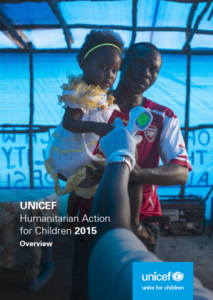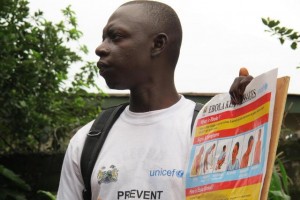UNICEF launches US$3.1 billion appeal to reach more children in emergencies
2015-01-29
Over 60 million children at risk in "new generation" of crises
 |
GENEVA/ HONG KONG, 29 January 2015 - UNICEF is launching a US$3.1 billion appeal – its largest ever – to reach 62 million children at risk in humanitarian crises worldwide – a US$1 billion jump in funding needs since last year’s appeal. “From deadly natural disasters to utal conflicts and fast-spreading epidemics, children across the world are facing a new generation of humanitarian crises,” said Afshan Khan, UNICEF’s Director of Emergency Programmes. “Whether in the headlines or hidden from view, emergencies sparked by social fracture, climate change and disease are stalking children in ways we have never seen before.” Growing numbers of children are facing increasingly complex and destructive conflicts, natural disasters and other emergencies, including the Ebola epidemic, which are placing them in extraordinary danger of violence, hunger, disease and abuse – and require increasingly more resources to address. |
| “I have just returned from Syria and Lebanon where millions of children have had their lives torn apart,” said Afshan Khan. “For the past four years, these children have been witnessing violence and death daily and have been missing out on the very basics in life. This appeal will help secure a future for not only the children of Syria but all children around the world who are impacted by humanitarian crises.” UNICEF’s Humanitarian Action for Children 2015 appeal targets a total of 98 million people, around two thirds of whom are children, in 71 countries. |
 © UNICEF/NYHQ2014-1738/Sonoda |
|
• UNICEF is also appealing for US$500 million to accelerate its work in the heart of Ebola-affected communities. The money will be used to scale up efforts to rapidly isolate and treat every case, prevent further outeaks, and continue to promote healthy behaviours to prevent the spread of the disease. The goal for 2015 is to get to zero cases and support the revitalisation of basic social services.
• In Nigeria, where attacks by armed groups have escalated in the past year causing more than 1 million people in the northeast to flee their homes, UNICEF is asking for $US26.5 million.
|
 © UNICEF/NYHQ2014-1057/Romero Torrecilla |
“This appeal will reach the most vulnerable children, wherever they are,” said Khan. “Where a child is born should not determine his or her destiny. We must get vital services and care to children in acute need now, to provide the building blocks that will allow them to create peaceful futures. This is not just about immediate humanitarian action as these short-term investments will have long-term gains.”
In 2014, UNICEF reached millions of children with humanitarian support – including vaccinating 16 million children against measles, treating 1.8 million children for the most serious form of malnutrition, providing almost 2 million children with psychological support and providing 13 million people with access to safe water. 2 million children were also given a better education – a crucial part of UNICEF’s emergency response as it helps restore children’s routine and gives them hope for the future.









